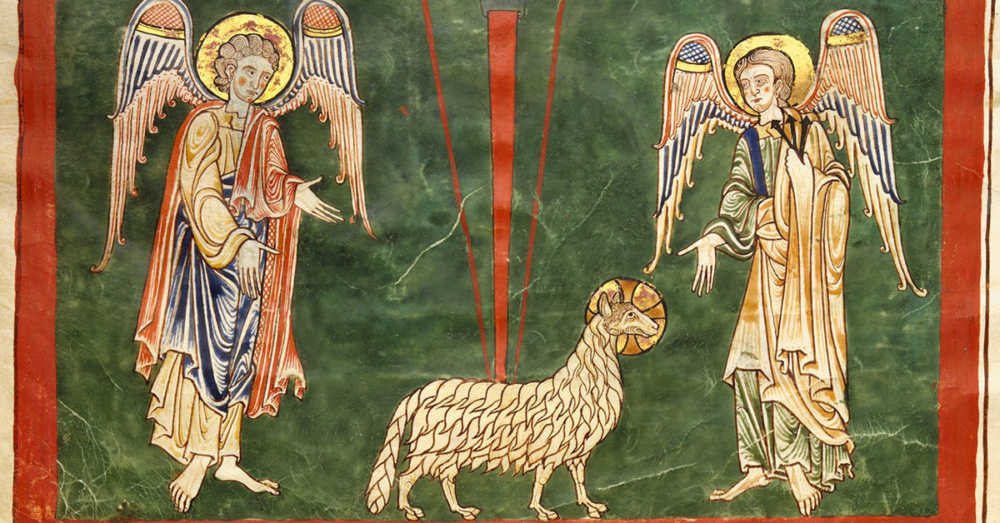We run our website the way we wished the whole internet worked: we provide high quality original content with no ads. We are funded solely by your direct support. Please consider supporting this project.

What Is God’s Glory?
In John 12 we find a view of God’s glory that challenges many modern notions of what the glory of God means. In this passage, we find that Jesus was “troubled” by the cross that lay ahead to such an extent that he wanted to cry out, “Father, save me.” But Jesus quickly expresses his resolve to go forward by saying, “No, it was for this very reason that I have come to this hour.” Then, with a view towards his crucifixion, Jesus exclaims: “Father, glorify your name,” at which point the voice of the Father thunders from the sky: “I have gloried it, and will glorify it again.” Jesus then goes on to declare: “when I am lifted up from the earth, I will draw all people to myself.” And just to make sure readers did not miss the point, John adds: “He said this to show the kind of death he was going to die” (12:27-8, 31-3).
This passage unambiguously identifies Jesus’ crucifixion as the “hour” when he will “glorify” the Father’s “name.” In ancient Jewish culture, to speak of a person’s “name” was to speak about their character and reputation. So, Jesus and the Father are both indicating that the Father’s character would most clearly shine forth—be “glorified”—when Jesus was crucified. While Jesus reflects the Father’s cruciform character throughout his ministry, the Father is “most glorified through the…‘lifting-up’… of the Son,” as Andrew Moody notes. Similarly, Gary Burge observes that, while God was of course glorified in Jesus’ miracles, it is only “on the cross that the mysterious, unfathomable glory of God is to be found.”
Colin Gunton argued that “[The glory of Christ is] lived up on the cross, and only through the trial of death is elevated to the glory that is reigning with the Father… if it is true that those who have seen him have seen the Father, then it is the Father who is revealed in the incarnate humanity of this man glorified through humbling.”
On top of this, Jesus tells us that it was “for this very reason” that he came into the world. As N.T. Wright puts it, the supreme glorification of the Father on the cross was “the climax and purpose of his whole work.” For, as Wright goes on to note, “in being thus ‘lifted up’…Jesus will draw all people to himself. How could it not be so, if indeed his cross is the true revelation of the true God, and if what we see in that revelation is the face of love?”
Now, if the crucifixion is the “climax and purpose of Jesus’ work,” we should understand everything else Jesus taught and did from this vantage point. To put it differently, since the cross was the supreme glorification of the Father, then the many other lesser ways Jesus glorified the Father should be understood as anticipating, and pointing toward, this event.
Let’s think about this another way. If Jesus is the center to which all Scripture points, then the cruciform glory of God that was supremely revealed on the cross must be regarded as the epicenter of this center. On this note, it’s significant that, when the resurrected Jesus “explained… all Scriptures concerning himself” to the disciples on the road to Emmaus, it was primarily to demonstrate that “the Messiah [had] to suffer these things,” which the disciples themselves had witnessed (Lk 24:26-7). And later, when Jesus “opened” the “minds” of the apostles “so they could understand the Scriptures,” it was primarily so they could see that it declared that “[t]he Messiah will suffer and rise from the dead on the third day” (vv.45-6).
What a strange glory!
—Adapted from Cross Vision, pages 37-38
Category: General
Tags: Character of God, Cross Vision, Crucifixion, Crucifixion of the Warrior God, Cruciform Theology, Glory
Related Reading

The Cross and the Witness of Violent Portraits of God
In my previous post I noted that the prevalent contemporary evangelical assumption that the only legitimate meaning of a passage of Scripture is the one the author intended is a rather recent, and very secular, innovation in Church history. It was birthed in the post-Enlightenment era (17th -18th centuries) when secular minded scholars began to…

What Changed on the Cross? (podcast)
Greg talks the sin economy and if sin actually threatens God. Episode 473 The Interview: http://traffic.libsyn.com/askgregboyd/Episode_CH_0473.mp3

Sin-Bearing God
On the cross, God became our sin, as Paul wrote: “God made him who had no sin to be sin for us” (2 Cor 5:21). However, God didn’t begin to be a sin-bearing God when Jesus walked the earth and hung on the cross. Rather he became Incarnate and bore our sins on the cross…

Reflections on the Supremacy of Christ (Part 2)
Whereas most Christians place the revelation of God in Christ alongside of other portraits of God and end up with an amalgamated image of God, we at ReKnew encourage believers to base their understanding of God completely on Christ, and especially on Christ crucified. And we encourage disciples to work to reinterpret through the lens…

Cruciform Theology in Four Steps
The culmination of the biblical narrative of the cross reframes everything about who God is, what it means to have faith in God, and how we read the Bible! The entire Old Testament leading up to the crucified Christ must be interpreted with a view toward discerning how it anticipates and points toward this definitive…

Sending Evil Spirits
In several infamous biblical depictions of Yahweh in the Old Testament, God is depicted as “sending” spirits to trouble and/or deceive people (Judg 9:22-3; 1 Sam 16:14, 23; 18:10; 19:9; 1 Kg 22:20-3). While there are several exegetical considerations that arguably help alleviate the problematic way these passages implicate God in unethical behavior, I nevertheless…
